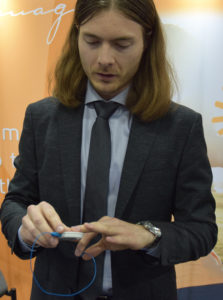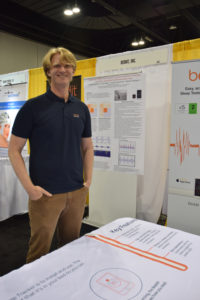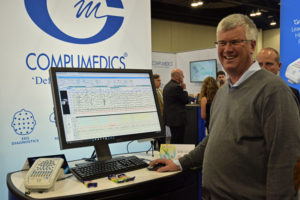DENVER, CO – There was a time when people with sleep disorders had to stay overnight in strange laboratories, with electrodes stuck to their heads, belts strapped to their chests, and oximeters taped to their fingers. All of these devices gave clinicians insight into their conditions. None of them made it easier to sleep.
But thanks to recent advances in digital and wearable technology, several startups are doing their best to make sleep medicine more comfortable. CyberMed News correspondent Brian Zahn recently attended Sleep 2016 in Denver, Colorado, where he spoke with four companies at the forefront of sleep care.
Home Monitoring
Broomfield, Colorado-based SleepImage has developed its Cardiopulmonary Coupling (CPC) technology to allow clinicians to remotely monitor their patients while they sleep. By placing a single electrode on their chests, patients can provide clinicians with information on several factors, including sleep time, body position, and snoring.
“Basically, we’re using an ECG signal to measure heart rate variability and respiration, and we’re looking at the relationship between the two,” explained Hugi Hilmisson, SleepImage’s head of business intelligence and analytics. “We want them to be in sync, because that’s when the parasympathetic nervous system is in charge and you’re fully resting.”
As patients lie in their beds, SleepImage’s FDA-cleared technology gathers and analyzes data, letting clinicians know when slight behavioral modifications will improve sleep, and when stronger interventions are needed.
A Smart-Bed Solution
Finnish company Beddit uses a tape-thin sensor to measure the body’s movements during sleep. From the faint pulse of a heartbeat, to the shifting about of a restless sleeper, Beddit’s sensor, which stretches across a mattress, can detect, identify, and interpret movements of all kinds.
“We’re looking at measuring sleep without in any way influencing sleep,” said Eliot Baker, head of content and partnerships at Beddit. “With Beddit, you don’t wear a thing. You just put the sensor on your bed, tuck it underneath a bed sheet, lie down on it, and in the morning you get your respiration, your heart rate, your movement, and your sleep quality.”
Beddit analyzes the data gathered by its sensor to generate a sleep score, which its users can check in the morning through a smartphone app. For an extra fee, users will receive a detailed sleep report, which they can review with a sleep care professional.
Faster Analysis
Traditional sleep medicine generates huge amounts of data that must be analyzed and scored by physicians. By continually evolving its sleep-scoring algorithm, which in most cases halves the time that clinicians have to spend scoring sleep data, Australian company Compumedics has remained at the forefront of sleep care for the past three decades.
“Compumedics has been a pioneer in computerized sleep medicine solutions from the beginning,” said Warwick Freeman, the company’s chief technology officer. “Our first customer was the first computerized sleep lab in the southern hemisphere. Our second customer was the inventor of CPAP.”
Recently, the company has moved to an entirely web-based platform, which allows physicians who would otherwise have to analyze and score data in a sleep lab to assess their patients from anywhere.
A Smart Pillow
Wish you could make six hours of sleep feel like eight? Sleep care startup Chrona Sleep has developed a device that turns your favorite pillow into a smart pillow to do just that.
“Chrona is a sleep enhancing pillow topper that you insert into your pillow case on top of your pillow,” explained Zimin Hang, the founder of Chrona Sleep. “Chrona tracks you while you sleep and uses non-invasive sounds and haptic feedback to enhance the quality of your sleep.”
Once Chrona detects that you’re asleep, it produces a series of low-frequency sounds that synchronize brain wave activity in the delta frequency band, which is a characteristic of deep sleep. When morning comes, Chrona produces higher frequency sounds to ease you into a lighter stage of sleep, before waking you up with a gently vibrating alarm.
Like the coverage that CyberMed News provides? Follow us on Twitter, LinkedIn, and Facebook to make sure you keep up to date on the most recent developments in digital health.









Be the first to comment on "4 Companies at the Forefront of Sleep Care"